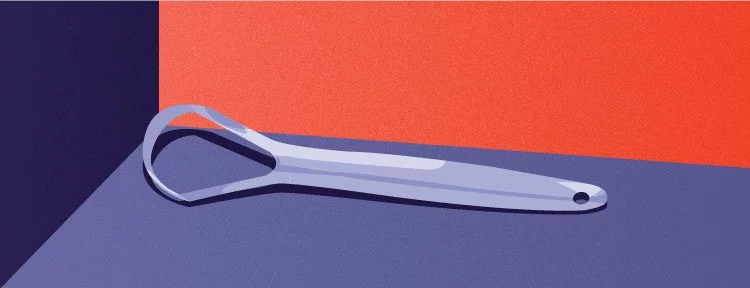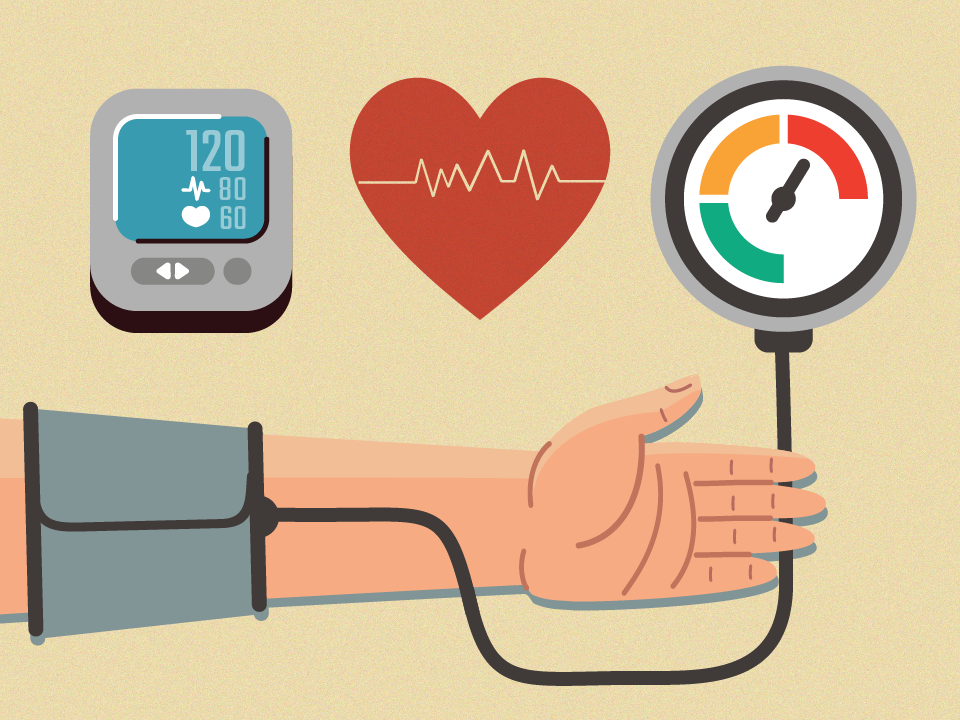As the benefits of oral hygiene become ever more clear, adding in a new element, like a tongue scraper, may get your mouth even closer to becoming squeaky clean. While brushing twice a day and flossing daily is the standard minimum oral hygiene practice, it is also common for some to add in rinsing with mouthwash. Tongue scraping is an excellent additional way to remove harmful bacteria and oral debris that cause bad breath and can contribute to the development of tooth decay and infections, as well as gum disease.
What is Tongue Scraping?
Tongue scraping involves a dental tool called a tongue scraper that has a flat, blunt edge attached to a handle. While many people clean their tongues using a toothbrush after brushing their teeth each morning and evening, some believe that an actual tongue scraper does a more thorough job of clearing the tongue of bacteria and food debris.

Benefits of Tongue Scraping
Good cleaning habits will always give some benefit. By taking a little extra time to thoroughly clean the tongue, you will open your mouth up to a myriad of benefits that will improve not only your oral health, but your overall health as well.
Improves taste by removing dead cells and food particles from taste buds
Enhances tongue appearance, restoring a healthy pink color
Reduces bad breath by eliminating odor-causing bacteria
Removes harmful bacteria that can lead to oral and systemic issues
Supports overall oral health by preventing gum disease and related complications
May contribute to better overall health by reducing risk of gum-related systemic conditions like heart disease and stroke
What Does a Tongue Scraper Do?
Studies conclude that a tongue scraper benefits your oral health in more ways than one and significantly enough to add the practice to your daily oral hygiene routine. Tongue scraping can remove bad breath causing bacteria resulting in harm and odor in your mouth. When compared to a toothbrush, using a tongue scraper daily can better clean out dead cells and food debris that can mask your taste buds.
Does Using a Tongue Scraper Improve Taste?
Just like removing fingerprints from glasses allows you to see better, scraping off dead cells and coating food particles allows your taste buds to touch the food more directly, improving your taste. A study that compared brushing the tongue with a toothbrush versus scraping the tongue with a tongue scraper found that taste improved with both, but significantly more so with the tongue scraper.
Do tongue scrapers damage taste buds?
Does A Tongue Scraper Improve Tongue Appearance?
Does a Tongue Scraper Remove Bacteria?
The oral cavity can be full of different types of bacteria, which can be helpful or harmful to your health. If there is an issue with your salivary glands or if food and drinks are not regularly scrubbed and removed from your mouth, the bacteria can wreak havoc on your oral health and even produce a pungent odor. Studies show that by using a tongue scraper for seven days, you can significantly reduce the number of bacteria on your tongue by simply adding this practice to your oral hygiene routine.
Does A Tongue Scraper Improve Overall Health?
When bacteria and food debris are routinely removed from the mouth, your overall oral health can improve tremendously. Bacteria, when allowed to remain on teeth, can inflame gums leading to serious gum diseases. This causes them to turn red, or even purple, eventually leading to gum recession, and potential tooth and bone loss if not treated. When gums are continually inflamed, this bacteria can even get into the bloodstream, contributing to artery blockage that leads to atherosclerosis and includes dangerous conditions like heart attacks and even strokes.
Does a Tongue Scraper Reduce Bad Breath?
The bacteria that accumulate on the tongue can develop a stale odor. The smell of morning breath may be the driving force that gets most people to brush their teeth in the morning for fear of embarrassment later with their co-workers. Using a tongue scraper can get all the gunky bacteria off your tongue in one or two swipes. There is some disagreement about whether the bacteria will soon return to your tongue. But because a tongue scraper is relatively inexpensive and because of the other benefits it provides, trying it for yourself is certainly worth it.

How to Use a Tongue Scraper
- Place the thin, blunt edge across your tongue at the very back of your oral cavity, without hurting or gagging yourself.
- Pull the scraper forward in the direction of the tip of your tongue, allowing the tongue scraper to gently scrape across the full length of your tongue.
- Repeat once, while rinsing the scraper with water in between scrapings.
When Should You Use A Tongue Scraper?
Are There Different Types of Tongue Scrapers?
Key Things to Know:
Scrapers come in plastic, metal, or brush-scraper combos
All types clean bacteria and film effectively
Pick based on comfort and preference
The act of scraping particles off of a tongue is fairly basic and the different appliances that accomplish this task are also pretty simple. Tongue scrapers have a non-pointy end that is a little less than the width of an average tongue. Some plastic scrapers have a single handle, while some stainless steel varieties have a double handle somewhat resembling a metal nutcracker. There are also tongue brushes that are flatter and wider than a toothbrush that have specialized bristles that are made for the grooves in the tongue.
How Do You Clean A Tongue Scrapper?
There are other tongue cleaners that are half scraper half brush. The different appliances used to clean tongues all do about the same job when it comes to removing bacteria and film from the tongue. Which tongue cleaner you choose comes down to your preference in how you like your tongue to be cleaned.
Are There Risks With Using a Tongue Scraper?
No, there are no side effects to using a tongue scraper when used properly. If you have a sensitive gag reflex, the tongue scraper may activate that reaction. Get yourself used to the feeling by not starting so far back in the mouth, but instead about halfway. Each day you scrape your tongue, you can try a little further back until you are able to start at the back of the tongue, scraping the entire tongue in one slow motion.
Can a Tongue Scraper Damage Your Tongue?
Find A Dentist
While brushing, flossing, and even tongue scraping can all work together to keep your mouth healthy, having a routine dental appointment twice a year with your trusted dentist will help ensure your teeth are healthy. If you do not have a dentist, use Smile Generation’s trusty Find a Dentist tool to discover an experienced, local dentist is your community.
Find your trusted, local dentist today!
Sources
Almas, K., Al-Sanawi, E., & Al-Shahrani, B. (2005, March). The effect of tongue scraper on mutans streptococci and lactobacilli in patients with caries and periodontal disease. National Institutes of Health. https://pubmed.ncbi.nlm.nih.gov/16032940/ (Accessed June 9th, 2025)
Matsui, M., Chosa, N., Shimoyama, Y., Minami, K., Kimura, S., & Kishi, M. (2014, January 14). Effects of tongue cleaning on bacterial flora in tongue coating and dental plaque: A crossover study. BMC Oral Health. https://bmcoralhealth.biomedcentral.com/articles/10.1186/1472-6831-14-4 (Accessed June 9th, 2025)
Quirynen, M., Avontroodt, P., Soers, C., Zhao, H., Pauwels, M., & Van Steenberghe, D. (2004, May 17). Impact of tongue cleansers on microbial load and taste. Journal of Clinical Periodontology. https://onlinelibrary.wiley.com/doi/10.1111/j.1600-051X.2004.00493.x (Accessed June 9th, 2025)
American Dental Association. (2022, June 30). Tongue scrapers and cleaners. MouthHealthy. https://www.mouthhealthy.org/all-topics-a-z/tongue-scrapers/ (Accessed June 9th, 2025)
Smile Generation blog articles are reviewed by a licensed dental professional before publishing. However, we present this information for educational purposes only with the intent to promote readers’ understanding of oral health and oral healthcare treatment options and technology. We do not intend for our blog content to substitute for professional dental care and clinical advice, diagnosis, or treatment planning provided by a licensed dental professional. Smile Generation always recommends seeking the advice of a dentist, physician, or other licensed healthcare professional for a dental or medical condition or treatment.







